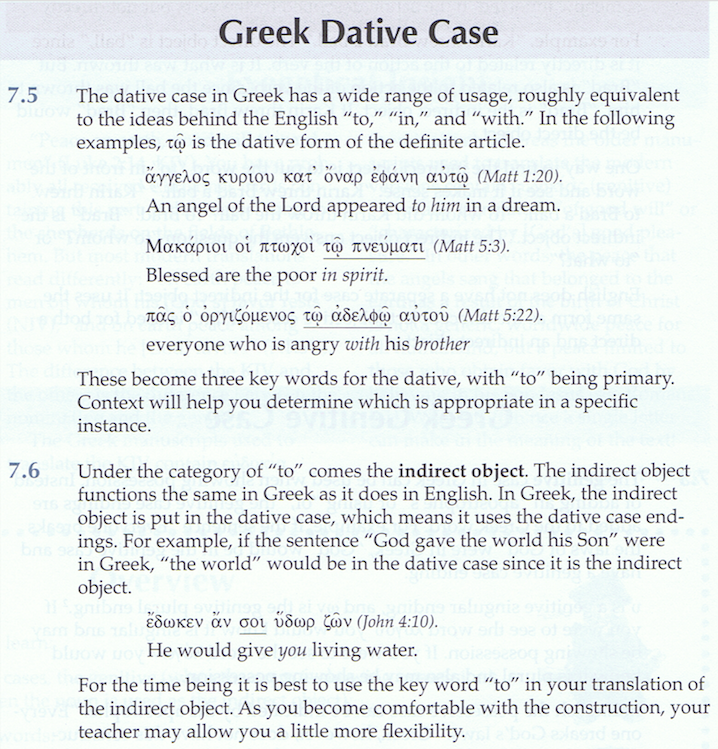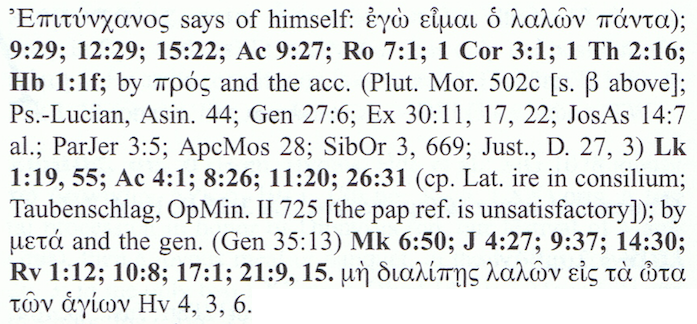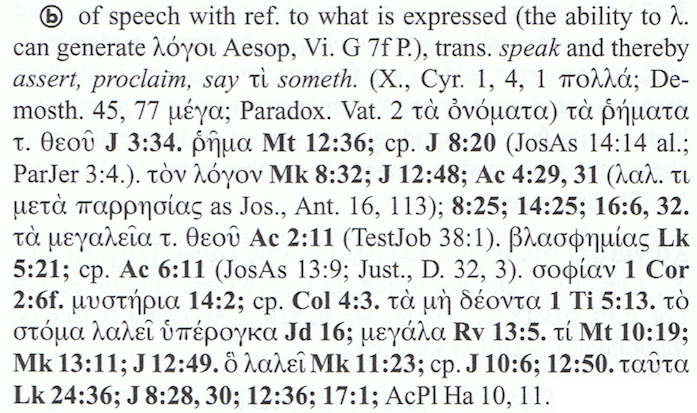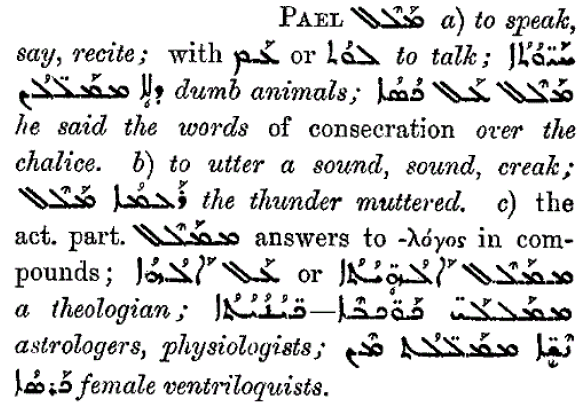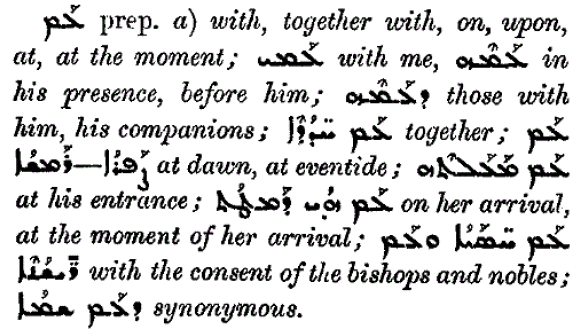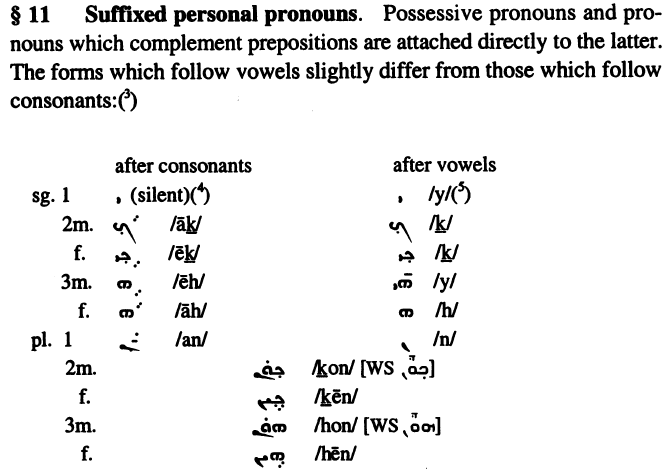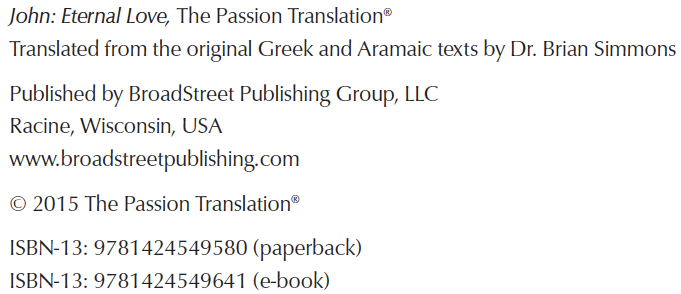I spent most of March this year investigating Brian Simmons’ claims to be translating from Aramaic in certain verses of the holy scriptures. I reluctantly came to the conclusion that he did not know the language and was in fact making use of existing English translations from the Aramaic Peshitta. I did my best to discuss the matter with Brian personally before going public with my conclusions, here and here. The only response I had from him was on Facebook, where he referred me to an English translation, and made no reference to the Syriac text, which I had included in the question I put to him about his supposed translation of Galatians 3.1.
It dawned on me gradually, as I was working on the Aramaic text of various verses, and examining Brian’s translator footnotes, that he might not know Greek or Hebrew either. There are many mistakes which I do not think that somebody with even elementary competence in these biblical languages could make. In this post, I share one of these and invite responses.
I am inclined to think that Brian is not translating from the original languages at all, but is working primarily from English translations, while additionally making reference to Greek and Hebrew lexicons. I put this to Brian and to the Editorial Director at Broadstreet Publishing, giving eight examples of footnotes in John: Eternal Love, and three from Psalms: Poetry on Fire, which seem to betray a lack of knowledge of Greek and Hebrew. I received a reply from the Editorial Director, but he did not address the specific points I made.
I then sought the opinion of someone who lectures in Greek at a well known ministerial training college in Australia. After examining the same footnotes, he made a statement, and gave me permission to forward it to the Editorial Director. This New Testament scholar had found:
frequent basic errors
which he would not expect from someone who had satisfactorily completed just one year of study.
He was forced to question whether Brian Simmons is actually translating from Greek texts as he claims to be:
In this post I begin to share the evidence I have found that Brian lacks elementary proficiency in Greek and Hebrew and is probably not translating at all.
John 15.22
Εἰ μὴ ἦλθον καὶ ἐλάλησα αὐτοῖς, ἁμαρτίαν οὐκ εἴχοσαν· νῦν δὲ πρόφασιν οὐκ ἔχουσιν περὶ τῆς ἁμαρτίας αὐτῶν.
"If I had not come and spoken to them, they would not have sin, but now they have no excuse for their sin. [NASB]
If I had not come and spoken to them, they would have no sin, but now they have no excuse for their sin. [NKJV]
If I had not come and spoken to them, they would not have been guilty of sin, but now they have no excuse for their sin. [ESV]
Bizarrely, in his John: Eternal Love (2015), Brian Simmons has the Lord Jesus saying
'If I had not come and revealed myself'
rather than
'If I had not come and spoken to them'.
Footnote ‘g’ supplies Simmons’ rationale for the change from
spoken to them
to
revealed myself
He says that it has been translated from the Aramaic. I show in an Addendum to this post that there does not appear to exist any basis in the Peshitta text for such a translation. He then says that the Greek text means:
‘spoken these things’.
The relevant part of the Greek text is:
ἐλάλησα αὐτοῖς
The meaning of ἐλάλησα is not at issue. It is the first person singular aorist active indicative of λαλέω, ‘to speak’. So ἐλάλησα means ‘I spoke’.
αὐτοῖς is a dative plural of αὐτός. It could be either masculine or neuter. αὐτός occurs 5597 times in the Greek New Testament, 1 making it the third most common word after the article and καί, which most often serves as a simple copulative conjuction and means just ‘and’.
αὐτός has three distinct functions, but ‘by far its most common use’ 2 is as the third person pronoun, ‘he’, ‘she’, ‘it’, in English. It is declined as follows, as given in Bill Mounce’s, Basics of Biblical Greek Grammar: 3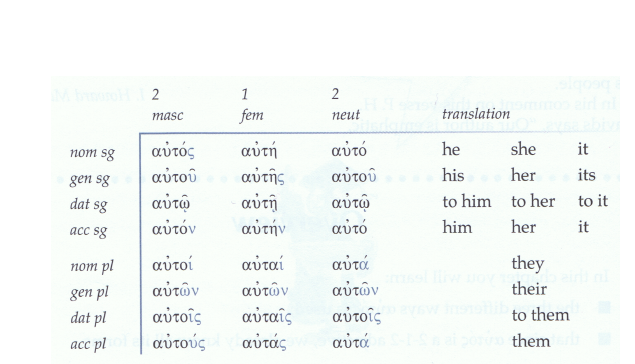
The Greek dative case conveys meanings ‘roughly equivalent’ to the English ‘to’, ‘in’ and ‘with’.[Mounce, Basics, §7.5, p. 44.[/ref] It will be noticed that Mounce gives ‘to them’ as his gloss (quick and simple translation) for αὐτοῖς.
The Greek dative case is used for the indirect object, much as ‘to’ is in English. If I say:
I gave the ball to John
‘ball’ is the direct object of ‘gave’ and ‘John’ is the indirect object. Likewise, if I say:
John said these things to Mary
‘these things’ are the direct object of the verb, and ‘Mary’ is the indirect object.
Here is Mounce on the Greek dative case:
To be certain that in John 15.22 αὐτοῖς is the indirect object of ἐλάλησα, we may consult the entry for λαλέω in the Bauer-Danker lexicon (BDAG). The person to whom one is speaking may be indicated in three ways:
- by the dative;
- by πρός and the accusative;
- by μετά and the genitive (rather as we can say we spoke ‘with’ someone, rather than ‘to’ someone)
For that which is expressed in the act of speaking, BDAG gives a number of examples. In all of these, that which is spoken is in the accusative case. For example:
- τὰ ῥήματα τοῦ Θεοῦ (the words of God)
- τὸν λόγον (the word)
- βλασφημίας (blasphemies)
- σοφίαν (wisdom)
The last example is:
- ταῦτα
ταῦτα is the accusative plural neuter of the demonstrative pronoun οὗτος ‘this’, and so means:
- ‘these [things]’.
Taking the first of BDAG’s examples of the use of ταῦτα with λαλέω:
Luke 24.36
Ταῦτα δὲ αὐτῶν λαλούντων αὐτὸς ἔστη ἐν μέσῳ αὐτῶν καὶ λέγει αὐτοῖς· εἰρήνη ὑμῖν. [Nestle-Aland 28]
While they were telling these things, He Himself stood in their midst and said to them, "Peace be to you." [NASB]
John 8.28
εἶπεν οὖν [αὐτοῖς] ὁ Ἰησοῦς· ὅταν ὑψώσητε τὸν υἱὸν τοῦ ἀνθρώπου, τότε γνώσεσθε ὅτι ἐγώ εἰμι, καὶ ἀπ’ ἐμαυτοῦ ποιῶ οὐδέν, ἀλλὰ καθὼς ἐδίδαξέν με ὁ πατὴρ ταῦτα λαλῶ. [NA 28]
So Jesus said, "When you lift up the Son of Man, then you will know that I am He, and I do nothing on My own initiative, but I speak these things as the Father taught Me. [NASB]
John 8.30
Ταῦτα αὐτοῦ λαλοῦντος πολλοὶ ἐπίστευσαν εἰς αὐτόν. [NA 28]
As He spoke these things, many came to believe in Him. [NASB]
As another example, John used λαλέω with ταῦτα just 11 verses before the verse we are examining:
John 15.11
Ταῦτα λελάληκα ὑμῖν ἵνα ἡ χαρὰ ἡ ἐμὴ ἐν ὑμῖν ᾖ καὶ ἡ χαρὰ ὑμῶν πληρωθῇ.
"These things I have spoken to you so that My joy may be in you, and that your joy may be made full.
ὑμῖν, meaning ‘to you (plural)’ is in the dative case as would be expected, ‘you’ being the indirect object.
Conclusion
It will be recalled that Brian Simmons claimed in his footnote that ἐλάλησα αὐτοῖς means ‘spoken these things’.
Since αὐτοῖς is dative, it must here be the indirect object of ἐλάλησα, so can only refer to the persons who Jesus had spoken to. ἑλάλησα αὐτοῖς must mean ‘I spoke to them’ and here, with the subject separated in the English sentence, ‘spoken to them’, as in the three normal translations (NASB, NKJV, ESV) I gave above.
If John had meant ‘spoken these things’, he would very probably have written ἐλάλησα ταῦτα.
This is very basic Greek. I do not yet see how somebody who has an even elementary competence in the language could make this mistake.
Andrew Chapman
addendum
The first claim in Simmons’ footnote ‘g’ was that the preceding words, which must include at least
and revealed myself
had been translated from the Aramaic:
The Peshitta text reads: 4
.
ܐܶܠܽܘ ܐܶܢܳܐ ܠܳܐ ܐܶܬ݂ܺܝܬ݂ ܡܰܠܠܶܬ݂ ܥܰܡܗܽܘܢ ܠܰܝܬ݁ ܗ݈ܘܳܬ݂ ܠܗܽܘܢ ܚܛܺܝܬ݂ܳܐ ܗܳܫܳܐ ܕ݁ܶܝܢ ܠܰܝܬ݁ ܠܗܽܘܢ ܥܶܠܬ݂ܳܐ ܥܰܠ ܐܰܦ݁ܰܝ ܚܛܺܝܬ݂ܗܽܘܢ
(ᵓelū ᵓennā lā ᵓeṯīṯ malleṯ ᶜamhon layt wāṯ ləhon ḥəṭīṯā hāšā dēn layt ləhon ᶜelṯā ᶜal ᵓappay ḥəṭīṯhon)
ܡܰܠܠܶܬ݂ (malleṯ) is the first person perfect Pa’el of ܡܠ, whose meaning in the Pa’el conjugation is given in Mrs Margoliouth’s Compendious Syriac Dictionary as ‘to speak, say, recite’ or ‘to utter a sound, sound, creak’ (p. 273):
ܥܰܡܗܽܘܢ (ᶜamhon) is the preposition ܥܡ, whose first meaning is ‘with’:
plus the third person masculine plural suffixed personal pronoun, ‘them’ in English: 5
Accordingly, two English translations of the Peshitta read as follows:
If I had not come and spoken with them, they had not had sin; but now have they no pretext for their sins. [Etheridge]
If I had not come and discoursed with them, sin would not have been to them; but now there is no excuse for their sins. [Murdock]
From where, then, did Simmons’ rendering
and revealed myself
come from? The answer, almost certainly, is that it derives from Victor Alexander’s version of John’s gospel. Alexander is a film-maker who promotes a style of ‘Felliniesque’ film-making where 6
dreams and reality are perceived as one experience.
I showed that in six out of ten cases in Galatians where Simmons was claiming to be translating from the Aramaic, his probable source was actually Alexander’s English text.
Alexander translates John 15.22 as:
Compare to Simmons’:
The meaning of ‘and revealed myself’ is in my opinion sufficient close to ‘to manifest myself’ to make it virtually certain that Simmons is once again basing his text on Alexander’s.
Finally, for completeness’ sake, here is Brian’s claim to have translated John’s holy gospel from
the original Greek and Aramaic texts
Is this true?
Andrew Chapman
Notes:
- Warren C. Trenchard, Complete Vocabulary Guide to the Greek New Testament, Revised Edition (Grand Rapids: Zondervan, 1998) p. 128. ↩
- William D. Mounce, Basics of Biblical Greek Grammar (Grand Rapids: Zondervan, 2009) p. 101. Mounce has 5597 as the number of times αὐτός is used in this function only. ↩
- Mounce, Basics, p. 100. ↩
- Text and transliteration is from the Peshitta Tool. Analysis for the verse is here. ↩
- T. Muraoka, Classical Syriac: A Basic Grammar, 2nd rev. ed. (Wiesbaden: Harrassowitz, 2005) p. 19. ↩
- For more information about Alexander, see my discussion here. ↩



